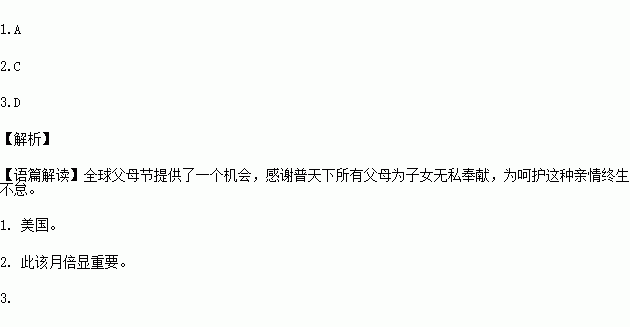题目内容
B
 To support and recognize the efforts of parents in bringing up their children, the Parents’ Day had began in USA. Parents’ Day actually gives an opportunity to the parents, their children and all the family members to gather at one place for celebrations. National Parents’ Day is important for all the children of the United States to show their love towards their parents. Apart from organizing a party and arrange some lovely activities, the children get the much required chance to gift cards and flowers to their parents.
To support and recognize the efforts of parents in bringing up their children, the Parents’ Day had began in USA. Parents’ Day actually gives an opportunity to the parents, their children and all the family members to gather at one place for celebrations. National Parents’ Day is important for all the children of the United States to show their love towards their parents. Apart from organizing a party and arrange some lovely activities, the children get the much required chance to gift cards and flowers to their parents.
 5th May is the Children’s Day and 8th May is the Parents’ Day in South Korea. Therefore, it’s a very special month in South Korea. Actually celebrated as Mother’s Day, 8th May, gives the opportunity to the large mass of Korea to show respect and celebrate the efforts of their parents. Flowers are given to their parents. A quality time is spent together for conveying(传递) a message of love and expressing thankfulness to the parents.
5th May is the Children’s Day and 8th May is the Parents’ Day in South Korea. Therefore, it’s a very special month in South Korea. Actually celebrated as Mother’s Day, 8th May, gives the opportunity to the large mass of Korea to show respect and celebrate the efforts of their parents. Flowers are given to their parents. A quality time is spent together for conveying(传递) a message of love and expressing thankfulness to the parents.
 Vietnam has a special day which is known as the Parents’ Day. Children grab the opportunity with both hands on 7th July every year to show love to their parents. It’s a day to show how special parents are to their own children. Parents and children enjoy the time as they gather at a place for taking part in different lovely activities. It’s a time to be happy. Parents get the opportunity to go out for the lunch and dinner along with their children. It’s, however, not a National Holiday in Vietnam but it’s a time for the Vietnamese to gift flowers and cards to parents.
Vietnam has a special day which is known as the Parents’ Day. Children grab the opportunity with both hands on 7th July every year to show love to their parents. It’s a day to show how special parents are to their own children. Parents and children enjoy the time as they gather at a place for taking part in different lovely activities. It’s a time to be happy. Parents get the opportunity to go out for the lunch and dinner along with their children. It’s, however, not a National Holiday in Vietnam but it’s a time for the Vietnamese to gift flowers and cards to parents.
The date of the Parents’ Day is different in different countries but purpose of celebrating the day is the same all over the world.
1.According to the first paragraph, we can learn Parents’ Day ______.
A. has its origin in America
B. is only celebrated by the parents
C. gives an opportunity to the parents to have a rest
D. takes place on the same day as the Children’s day
2. Why is May a very special month in South Korea?
A. The parents can stay at home with their kids.
B. Kids receive many flowers from their parents.
C. There are two important days during this month.
D. Every family can get together happily on the weekends.
3.What is the date of the Parents’ Day in Vietnam?
A. On 1st January..
B. On 5th May.
C. On 8th May.
D. On 7th July.

